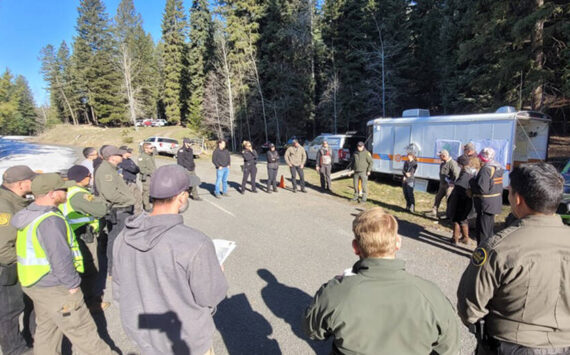OROVILLE – Oroville Police Chief Clay Warnstaff shared a map with the city council that plots out Oroville’s new Drug Free Zone.
The Drug Free Zone ordinance doubles penalties and fines for drug dealers arrested and convicted of selling drugs within 1000 feet of city-owned property, such as parks and other facilities, much like the Drug Free Zones already established around Oroville School District property.
Since Oroville has several parks this new zone actually takes in the lion’s share of all property within the city limits. Chief Warnstaff presented the map to the council at their Tuesday, April 21 meeting. The council had voted unanimous approval of the Drug Free Zone under Ordinance 763 at a previous meeting. The ordinance required the map before it could be put into effect.
Rod Noel, Superintendent of Public Works, gave an update on funding new equipment at the wastewater treatment plant for bio-solids handling.
“Basically our fund source from the county is somewhat depleted,” said Supt. Noel. “Chris, Kathy and I went to meet with the county planner who told us the county used part of the Public Works Trust Fund loan for an overlay on Eastlake Road. That was about $600,000, which is about what we would be short from the Public Works Trust Fund monies.”
The county secured a low-interest loan from the state Public Works Trust Fund to complete the East Side Sewer Project which serves residences on the east side of Lake Osoyoos, as well as Oroville’s airport and industrial park. Some of the remaining funds were used to make improvements to the existing sewer system in Oroville and the city was counting on using more of the fund for its Bio-solids Project. The loan for the sewer project and other improvements will be paid back by new sewer customers, while the Bio-solids Project when completed would be paid back by all customers that use Oroville’s wastewater treatment facility.
“The total funds left from the Public Works Trust Fund Loan are about $1 million. To complete the Bio-Solids Project with engineering will be about $1.8 million,” said Noel, who adds the chances of getting federal stimulus money is “up in the air.”
Noel said there have been about $50 million in requests for about $4 million in anticipated federal stimulus dollars for the county.
“Stimulus dollars for us are a long shot,” he said.
He went on to add that the city has contacted Rural Development for federal dollars and that the representative from Wenatchee was looking for some “gap funds.”
“We talked with the engineers about paring the project back, but they caution that it would probably mean the project costs more in the long run,” said Noel. “After meeting with the county commissioners there is one more option that we borrow from the Public Works Road Fund because the money for the overlay was never intended to come from the Public Works Trust Fund. They (the commissioners) were unaware of the impact it would have on our project.”
In 2007, when the county approved the use of the Public Works Trust Fund monies for Oroville’s Bio-Solids Project the county had not paid for the overlay yet, according to Noel.
“Back then we were told there was about $1.8 million available,” he said.
Noel told the council that city staff would get a package together, even if the project has to be downsized, to get started if the dollars can’t be found anywhere else. He said borrowing from Rural Development would mean higher interest, but the upside would be a longer payback period.
“You can have longer terms of up to 40 years which could keep the cost per residence down,” said Noel.
“And that’s always been a concern… keeping the costs down,” said Mayor Chuck Spieth.
“It’s always been a source of pride for the city that we don’t have the higher rates of a Tonasket, Omak or Leavenworth,” added Kathy Jones, Oroville Clerk-Treasurer.
Noel said the city had spent a lot of money already and that eventually the Department of Ecology is bound tell the town it has to do something about the bio-solids.
In other business, the Washington State Liquor Control Board sent an offer to the city to comment on a request for a liquor license transfer for a business to be called The Pastime on Central. The business plans to locate at 813 Central in the old Gazette-Tribune building.
“I have heard numerous concerns about the location of this move,” said Mayor Chuck Spieth, “there is no parking to begin with.”
Councilman Ed Naillon worried that the new business would be adjacent to a residential area.
“I have also received concerns that the location does not allow for much parking, it is near residential and is across the street from a church,” said Councilwoman Neysa Roley.
Clerk Jones said parking is an issue anywhere in town, however, locating a bar in the building would represent a change of use.
“I also think they are required to install fire sprinklers,” said Jones.
Councilman Jon Neal made a motion to send the council’s objections to a license transfer based on the proposed bar’s proximity to residences, a church and the Care Net pregnancy center. Councilman Walt Hart seconded the motion and it was approved unanimously by the council.






